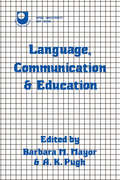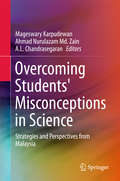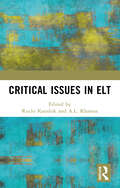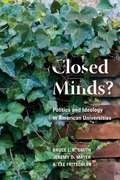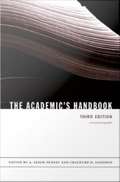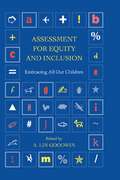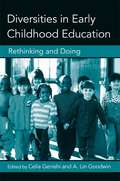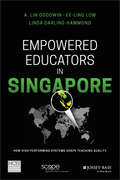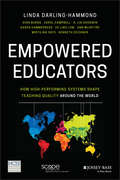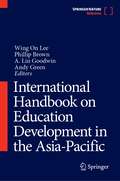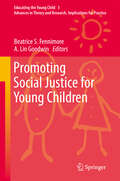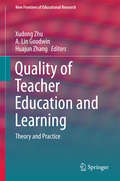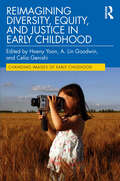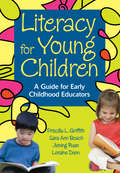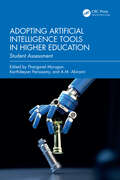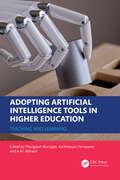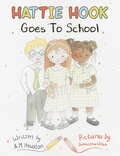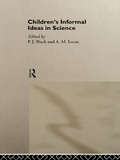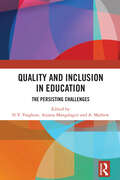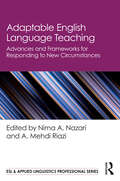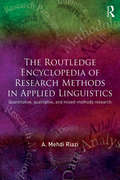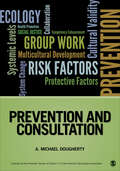- Table View
- List View
To Write Good Tamil: நல்ல தமிழ் எழுத வேண்டுமா
by A. K. Paranthaamanarதமிழ்மொழி, ஆட்சி மொழியாகும் காலம் நெருங்கி விட்டது. தமிழ் வெளியீடுகளும் நாளிதழ்களும் நல்ல தமிழில் வெளிவரல் வேண்டும். எழுத்தாளர்கள் பிழையின்றி எழுத வேண்டுமானால், ஓரளவு நடைமுறை இலக்கணம் தெரிந்து கொள்ளுதல் இன்றியமையாதது. இந்நூலாசிரியர் நீண்ட கால அனுபவம் வாய்ந்தவர். எனவே பெருவரவாகக் காணப்படும் பிழைகளை இவர் இந்நூலில் எடுத்துக் காட்டித் திருத்தங்களையும் கொடுத்துள்ளார்; வல்லெழுத்துமிகும் இடங்களையும் மிகாத இடங்களையும் எளிய முறையில் விளக்கியுள்ளார்; சந்தி முறைகளை மிக எளிதாகக் காட்டியுள்ளார்; சொற்றொடர்ப்பிரிப்புகளில் ஏற்படும் தவறுகளை எடுத்துக்காட்டி விதிகளையும் வகுத்துள்ளார். ஆதலால், நல்ல தமிழ் எழுத விரும்பும் பலர்க்கும் இந்நூல் பயன்படக்கூடியது
Language, Communication and Education
by Barbara M. Mayor A. K. PughExamines communication in the classroom within the larger context of the development of standard English and its social implications.
Advertising Basics
by J. V Vilanilam A. K. VargheseThis book introduces the readers-students of mass communication departments and those who have already entered the world of advertising-to the history, socioeconomic importance and the practical aspects of creating ad copy for the print and electronic media.
Learning to Change Lives
by A. Ka TsangThe Strategies and Skills Learning and Development (SSLD) system is an action-oriented model for enabling clients in social work, health, mental health, and human services settings to address their needs and life goals. In Learning to Change Lives, author A. Ka Tat Tsang introduces SSLD's powerful framework and practice, which has been developed based on three decades of experience in psychotherapy, counselling, education, training, consultation, and community service.Learning to Change Lives provides detailed, step-by-step guidelines for SSLD intervention - starting with engagement with the client, assessment, translating problems into intervention plans, systematic learning and development of appropriate strategies and skills. Key practice procedures are described clearly and illustrated by case examples, specific instructions, and sample worksheets. Aimed at clinical practitioners, mental health professionals, social workers, and other human service professionals, this book can be used as a manual by practitioners and as a textbook for courses and training programs.
Overcoming Students' Misconceptions in Science
by Mageswary Karpudewan Ahmad Nurulazam Md Zain A. L. ChandrasegaranThis book discusses the importance of identifying and addressing misconceptions for the successful teaching and learning of science across all levels of science education from elementary school to high school. It suggests teaching approaches based on research data to address students' common misconceptions. Detailed descriptions of how these instructional approaches can be incorporated into teaching and learning science are also included. The science education literature extensively documents the findings of studies about students' misconceptions or alternative conceptions about various science concepts. Furthermore, some of the studies involve systematic approaches to not only creating but also implementing instructional programs to reduce the incidence of these misconceptions among high school science students. These studies, however, are largely unavailable to classroom practitioners, partly because they are usually found in various science education journals that teachers have no time to refer to or are not readily available to them. In response, this book offers an essential and easily accessible guide.
Critical Issues in ELT
by Ruchi Kaushik A. L. KhannaELT, a vast and growing field of research, has now moved beyond primary concerns related to developing learners’ proficiency in the language and designing curricula, syllabi, materials and assessment tools. It is witnessing rapid development towards de-centralizing and de-elitizing English, promoting multilingual approaches for teaching English and bridging the gap between language-in-education policies and practices.Critical Issues in ELT compiles research papers by linguists, language teachers, and English language teaching professionals to present contemporary debates on critical issues related to English language teaching, primarily in India. The subject matter of this book includes a variety of articles based on empirical data. It discusses the challenges facing ELT today and also includes papers discussing theoretical positions/frameworks/issues in ELT, classroom-based action research projects, and personal narratives.Print edition not for sale in South Asia (India, Sri Lanka, Nepal, Bangladesh, Pakistan or Bhutan)
Closed Minds? Politics and Ideology in American Universities
by Bruce L. R. Smith Jeremy D. Mayer A. Lee FritschlerFrom interviews, focus groups, and a national survey, this book paints a comprehensive picture of today's campus political attitudes, contrasts the current climate of disengagement with the original civic mission of American colleges and universities, and suggests how universities can reclaim and strengthen their place in the nation's political and civic life.
The Academic's Handbook
by Craufurd D. Goodwin A. Leigh DeneefThis new, revised, and expanded edition of the popularAcademic’s Handbookis an essential guide for those planning or beginning an academic career. Faculty members, administrators, and professionals with experience at all levels of higher education offer candid, practical advice to help beginning academics understand matters including: The different kinds of institutions of higher learning and expectations of faculty at each. The advantages and disadvantages of teaching at four-year colleges instead of research universities. The ins and outs of the job market. Alternatives to tenure-track, research-oriented positions. Salary and benefits. The tenure system. Pedagogy in both large lecture courses and small, discussion-based seminars. The difficulties facing women and minorities within academia. Corporations, foundations, and the federal government as potential sources of research funds. The challenges of faculty mentoring. The impact of technology on contemporary teaching and learning. Different types of publishers and the publishing process at university presses. The modern research library. The structure of university governance. The role of departments within the university. With the inclusion of eight new chapters, this edition ofThe Academic’s Handbookis designed to ease the transition from graduate school to a well-rounded and rewarding career. Contributors. Judith K. Argon, Louis J. Budd, Ronald R. Butters, Norman L. Christensen, Joel Colton, Paul L. Conway, John G. Cross, Fred E. Crossland, Cathy N. Davidson, A. Leigh DeNeef, Beth A. Eastlick, Matthew W. Finkin, Jerry G. Gaff, Edie N. Goldenberg, Craufurd D. Goodwin, Stanley M. Hauerwas, Deborah L. Jakubs, L. Gregory Jones, Nellie Y. McKay, Patrick M. Murphy, Elizabeth Studley Nathans, A. Kenneth Pye, Zachary B. Robbins, Anne Firor Scott, Sudhir Shetty, Samuel Schuman, Philip Stewart, Boyd R. Strain, Emily Toth, P. Aarne Vesilind, Judith S. White, Henry M. Wilbur, Ken Wissoker
Assessment for Equity and Inclusion: Embracing All Our Children
by A. Lin GoodwinHow students are assessed can determine not only the quality, type, and degree of education they receive, but has long-term consequences for their future. Assessment by standardized testing often labels poor and minority children in ways that exclude them from opportunities, while failing to measure their true potential. Assessment for Equity and Inclusion confronts the debate between standardized testing and alternative assessment methods, locating strategies of assessment by which students are included rather than excluded.
Diversities in Early Childhood Education: Rethinking and Doing (Changing Images of Early Childhood)
by A. Lin Goodwin Celia GenishiThis collection, edited by leaders in the field of early childhood and multicultural education, is a valuable resource for those studying and working with young children. Chapters emphasize the relationship between theory, research, and practice, and provide illustrations of equitable and inclusive practices that move us toward social justice in the critical field of early childhood education. Drawing from the current literature on ability, class, culture, ethnicity, gender, languages, race, and sexual orientation, the book presents a forward-looking account of how diversity could improve the educational experience of children from birth to grade three.
Empowered Educators in Singapore: How High-Performing Systems Shape Teaching Quality
by A. Lin Goodwin Linda Darling-Hammond Ee-Ling LowBEST PRACTICES FROM SINGAPORE'S HIGH-PERFORMING SCHOOL SYSTEM Empowered Educators in Singapore is one volume in a series that explores how high-performing educational systems from around the world achieve strong results. The anchor book, Empowered Educators: How High-Performing Systems Shape Teaching Quality Around the World, is written by Linda Darling-Hammond and colleagues, with contributions from the authors of this volume. Empowered Educators in Singapore delves into the country's rapid rise to educational excellence on a global scale and the national effort that drives it. Singaporean students routinely outperform their peers from around the world, placing first or second in international assessments, particularly in math and science. In 2015, Singaporean students topped the league table for both the Programme in International Student Achievement (PISA) and the Trends in International Mathematics and Science Study (TIMSS). With educators around the world clamoring for the "Singapore secret," the reality is that Singapore's excellence is the result of a 25-year drive to improve education through systemic, long-term and ongoing, consistent, and deliberative reform with an emphasis on teacher quality. This book describes the interwoven strategies that merge context, quality, governance, and continual evolution into a consistently high-achieving student population.
Empowered Educators: How High-Performing Systems Shape Teaching Quality Around the World
by A. Lin Goodwin Linda Darling-Hammond Ee-Ling Low Carol Campbell Ann McIntyre Dion Burns Karen Hammerness Mistilina Sato Ken ZeichnerDiscover how high-performing systems shape teaching quality around the world Producing highly skilled and committed teachers is not the work of a single innovative school or the aggregation of heroic individuals who succeed against the odds. In high-performing countries, the opportunities for teachers to learn sophisticated practices and continue to improve are embedded systemically in education policies and practices. Empowered Educators describes how this seemingly magical work is done—how a number of forward-thinking educational systems create a coherent set of policies designed to ensure quality teaching in all communities. . . and how the results are manifested in practice. Spanning three continents and five countries, Empowered Educators examines seven jurisdictions that have worked to develop comprehensive teaching policy systems: Singapore and Finland, the states of New South Wales and Victoria in Australia, the provinces of Alberta and Ontario in Canada, and the province of Shanghai in China. Renowned education expert Linda Darling-Hammond and a team of esteemed scholars offer lessons learned in a number of areas that shape the teaching force and the work of teachers, shedding unprecedented light on areas such as teacher recruitment, preparation, induction and mentoring, professional learning, career and leadership development, and more. Find out how quality teaching is developed and conducted across the globe Discover a common set of strategies for developing, supporting, and sustaining the ongoing learning and development of teachers and school leaders See how high-performing countries successfully recruit and train educators Understand why the sharing of expertise among teachers and administrators within and across schools is beneficial A fascinating read for researchers, policymakers, administrators, teacher educators, pre-service teachers and leaders, and anyone with an interest in education, this book offers a rare glimpse into the systems that are shaping quality teaching around the world.
International Handbook on Education Development in the Asia-Pacific
by A. Lin Goodwin Wing On Lee Andy Green Phillip BrownThe Springer International Handbook of Educational Development in Asia Pacific breaks new ground with a comprehensive, fine-grained and diverse perspective on research and education development throughout the Asia Pacific region. In 13 sections and 127 chapters, the Handbook delves into a wide spectrum of contemporary topics including educational equity and quality, language education, learning and human development, workplace learning, teacher education and professionalization, higher education organisations, citizenship and moral education, and high performing education systems. The Handbook is grounded in specific Asia Pacific contexts and scholarly traditions, using unique country-specific narratives, for example, Vietnam and Melanesia, and socio-cultural investigations through lenses such as language identity or colonisation, while offering parallel academic discourse and analyses framed by broader policy commentary from around the world.
Promoting Social Justice for Young Children
by A. Lin Goodwin Beatrice S. FennimoreThis book explores important current social justice issues that confront young children in America. A broad range of topics related to the fair treatment of young children and their families are approached with a fresh and hopeful energy. The central argument of this volume is that a fair and just society must protect the basic needs of all children so they are able to reach their full potential to learn, grow, and ultimately become productive democratic citizens. The book includes contributions from an impressive group of authors who have been consistent voices for the fair and equitable treatment of children in school and society. Each chapter examines a critical issue in child social justice with a focus on the current problem, historical importance of the issue, potential solutions, and a vision for the future. The book has been developed to reach a wide audience of professionals whose work involves children and who have grown concerned about social forces that cause child suffering and threaten the well-being or even the survival of children in the United States. Readers will come away with up to date information and a renewed commitment to being life-long advocates for children.
Quality of Teacher Education and Learning
by A. Lin Goodwin Xudong Zhu Huajun ZhangThis edited book is on the theory and practice of teacher education from the most distinguished and experienced scholars in the field around the world. In this book, they explored the most urgent and significant issues in teacher education in this globalized time. The dealing of these issues can directly impact the quality of teacher education and education in general. How to improve the quality of teacher education is a global issue that many countries, no matter developed or developing, face. This book provides multiple perspectives to address the challenges and possibilities for improving teacher quality. A point needs to further highlight in this book is that the researchers pay more attention to the inner landscape of teachers, such as the issue of identity, sense of person, etc. In this book, the readers can learn the insights and multiple perspectives of the best scholars in teacher education.
Reimagining Diversity, Equity, and Justice in Early Childhood (Changing Images of Early Childhood)
by A. Lin Goodwin Celia Genishi Haeny YoonSituated against a backdrop of multiple global pandemics—COVID-19, racial injustice and violence, inequitable resource distribution, political insurrections and unrest—this timely and critical volume argues for a divestment in white privilege and an investment in anti-racist pedagogies and practice across early childhood contexts of research, policy, and teaching and learning. Featuring established scholar-practitioners alongside emerging voices, chapters explore key issues around equitable and inclusive practices for young children, covering topics such as multilingualism and multicultural practices of immigrant communities, language varieties, and dialects across the Black diaspora, queer pedagogies, and play at the intersection of race, gender, disability, and language. Thoughtfully and compellingly written, each chapter offers an overview of the issue, the theoretical framework and critical context surrounding it and implications for practice.
Literacy for Young Children: A Guide for Early Childhood Educators
by Jiening Ruan Priscilla L. Griffith Sara Ann Beach A. Loraine DunnThis research-based guidebook offers PreK and kindergarten teachers easy-to-implement activities to develop oral language, phonological and print awareness, emergent writing, and comprehension skills in diverse classrooms.
Adopting Artificial Intelligence Tools in Higher Education: Student Assessment
by Thangavel Murugan Karthikeyan Periasamy A. M. AbiramiThis edited volume explores the adoption of artificial intelligence (AI) tools in higher education, specifically focusing on student assessment. It examines the integration of various AI tools within higher education, discussing the challenges and opportunities they present and the innovative solutions they offer.The chapters explore various issues surrounding the use of AI in higher education and propose potential solutions. The book begins with a systematic exploration of AI's potential, presenting innovative ways to ensure fair and accurate assessments that enhance the overall quality of education. It highlights the benefits of AI-powered grading systems that streamline assessment processes, provide timely feedback, and promote fair evaluations. The text discusses how machine learning algorithms can revolutionize assessment methods, allowing individualized, adaptive testing tailored to each student's unique needs. Furthermore, it examines natural language processing (NLP) techniques for evaluating student essays by analyzing linguistic features such as grammar and semantic coherence. Moreover, it highlights AI-powered virtual assistants offering personalized feedback and learning recommendations. Case studies illustrate successful AI assessment implementations and methods for improving AI-based evaluations. The book also addresses engagement and success in the post-COVID-19 context. It raises concerns about plagiarism and academic integrity, comparing AI solutions to traditional methods while exploring the challenges associated with adopting AI in education. Educators, administrators, academics, and technology experts working in institutes of higher learning will find this volume compelling. It is also suitable for students taking courses in educational technology, e-learning, and digital learning.
Adopting Artificial Intelligence Tools in Higher Education: Teaching and Learning
by Thangavel Murugan Karthikeyan Periasamy A. M. AbiramiThis book offers a modern exploration of the intersection of technology and education. It examines the prospects of integrating different AI tools into higher education and explores the challenges, opportunities, and innovative solutions for the different issues surrounding the use of AI in higher education.Each chapter discusses a different area where AI can enhance the educational landscape, such as AI integration in higher education and immersive virtual reality-based learning environments. The book also emphasizes student-centered learning, AI-powered frameworks for academic excellence, and learner-centric pedagogies. Furthermore, it delves into the role of AI in personalized learning in STEM courses, the development of AI-based tutoring systems, and the use of machine learning to identify students’ mental health status. The volume concludes with "Dynamic Horizon," which examines how AI and gamification are shaping higher education.This book is essential for educators, administrators, researchers, and policymakers who want to leverage AI to create an adaptive, personalized, and engaging learning environment. Adopting Artificial Intelligence Tools in Higher Education provides valuable insights into the future of education, paving the way for a more empowered and enlightened academic world.
Hattie Hook Goes to School
by A. M. HoustonStarting school is a huge hurdle for many children. Anxious parents look on and worry about how their precious little ones will settle into this big new adventure. Some parents or carers might wonder how their mischievous offspring will manage in the confines of a classroom with strict routines. Reading all about starting school is useful in helping children to adjust to a new but also very interesting and fun routine in a big new world of learning. In Hattie Hook Goes to School, meet capable and caring Mrs. Gulliver; the lovely early years teacher, who knows just how to manage shy Hattie, tearful Pip and lively Nigel. Come into Mrs. Gulliver’s interesting classroom and find out how Hattie, Pip and Nigel manage on their very first day at school. They discover that school is not at all scary but really rather fun. Look and see how the children learn all about the importance of helping and of holding hands. Learn how Mrs. Gulliver is well prepared for little five-year-old mishaps. Finally, discover how the children in Classroom 1 just might return for more school tomorrow!
Children's Informal Ideas in Science
by P. J. Black A. M. LucasThe ideas that children have about science concepts have for the past decade been the subject of a wealth of international research. But while the area has been strong in terms of data, it has suffered from a lack of theory. Children's Informal Ideas in Science addresses the question of whether children's ideas about science can be explained in a single theoretical framework. Twelve different approaches combine to tackle this central issue, each taking a deliberately critical standpoint. The contributors address such themes as values in research, the social construction of knowledge and the work of Piaget in a rich contribution to the debate without claiming finally to resolve it. The authors conclude with a discussion of how a theory can be built up, along with suggestions for ways ahead in the research.
Quality and Inclusion in Education: The Persisting Challenges
by N. V. Varghese Anjana Mangalagiri A. MathewThis book calls for an equitable and qualitative access to education for all. It proposes paradigms of educational governance that are based on coalition building between key stakeholders, are grounded in local and cultural contexts, sensitive to the language needs of communities. It underlines the significance of gender sensitive and inclusive approaches that ensure equity for marginalized children and minorities. Based on research-based studies, the volume focuses on equity, quality, and learning — covering a broad spectrum, from school to higher, to adult education. It discusses the multiple learner deprivations amongst the marginalized communities and the severe impact of events such as pandemics that exacerbate learner inequities and the recent developments in India under the National Education Policy 2020. It also presents research-based country experiences in the Asian (India, Bangladesh, China) and African (Ghana, South Africa) contexts, showing how external influences on the changing priorities in policy perspectives cut across developing countries. Compiled in honour of Professor R. Govinda, this volume of insightful articles will be of interest to students and researchers of educational policy and studies, sociology of education, equity and human rights. It will also be useful for decision makers and think tanks.
Adaptable English Language Teaching: Advances and Frameworks for Responding to New Circumstances (ISSN)
by A. Mehdi Riazi Nima A. NazariIn an age of rapid technological transformation and evolving teaching settings, the ELT community must adapt to the needs of emerging situations and a diverse range of learners. Adaptable English Language Teaching addresses this need by bringing together contributions from renowned scholars around the world with insights on all major areas of English language teaching with an emphasis on adaptability—of teaching method, context, skills, and priorities.Organized around an innovative past-present-future structure, chapters offer methods, strategies, and perspectives that are adaptable to any difficult or under-resourced context. It delves into engaging through online applications, understanding emerging trends in computer-assisted language learning and teaching, and the implementation of virtual classroom and multimodality in ELT.Given its multifaceted focus, this book will provide ELT practitioners, trainers, trainees, and researchers with invaluable insights and research findings to effectively navigate and adapt to emerging circumstances.
The Routledge Encyclopedia of Research Methods in Applied Linguistics
by A. Mehdi RiaziThe Routledge Encyclopedia of Research Methods in Applied Linguistics provides accessible and concise explanations of key concepts and terms related to research methods in applied linguistics. Encompassing the three research paradigms of quantitative, qualitative, and mixed methods, this volume is an essential reference for any student or researcher working in this area. This volume provides: A–Z coverage of 570 key methodological terms from all areas of applied linguistics; detailed analysis of each entry that includes an explanation of the head word, visual illustrations, cross-references to other terms, and further references for readers; an index of core concepts for quick reference. Comprehensively covering research method terminology used across all strands of applied linguistics, this encyclopedia is a must-have reference for the applied linguistics community.
Prevention and Consultation (Prevention Practice Kit)
by A. Michael DoughertyThis sixth book in the Prevention Practice Kit provides an introduction to evidence-based prevention in psychology. Counselors, psychologists and mental health workers in schools, government agencies, community settings, and in private practice are increasingly expected to select evidence-based practices and programs, and to document the effectiveness of the care they provide. The book addresses the types of questions that may be most pertinent to counselors, psychologists, and other mental health workers who are engaged in prevention and interested in understanding evidence-based programs, including:What does it mean to for a program to be evidence-based?How should I go about selecting an evidence-based program?How do I know if evidence is trustworthy?How do I gather evidence to evaluate my own prevention program?The book introduces several definitions of evidence-based practice and the common components of these definitions. A broad overview of considerations for evaluating the quality and trustworthiness of prevention research is provided along with a discussion of common features of effective prevention programs. Guidance is provided on identifying evidence-based programs, including detailed descriptions of online registries of prevention programs. The book also provides recommendations for determining the need for a prevention program, selecting and implementing an appropriate program, and evaluating outcomes. Throughout the text, examples from research and practice are used to illustrate important concepts, and learning exercises at the end of each chapter augment comprehension and relevance.This book is part of the Prevention Practice Kit: Action Guides for Mental Health, a collection of eight books each authored by scholars in the specific field of prevention and edited by Dr. Robert K. Conyne and Dr. Arthur M. Horne. The books in the collection conform to the editors′ outline to promote a consistent reading experience. Designed to provide human services practitioners, counselors, psychologists, social workers, instructors, and students with concrete direction for spreading and improving the practice of prevention, the series provides thorough coverage of prevention application including a general overview of prevention, best practices, diversity and cultural relevance, psychoeducational groups, consultation, program development and evaluation, evidence base, and public policy.This book is endorsed by the Prevention Section of the Society of Counseling Psychology of the American Psychological Association. Fifty percent of all royalties are donated to Division 17 of the APA.

